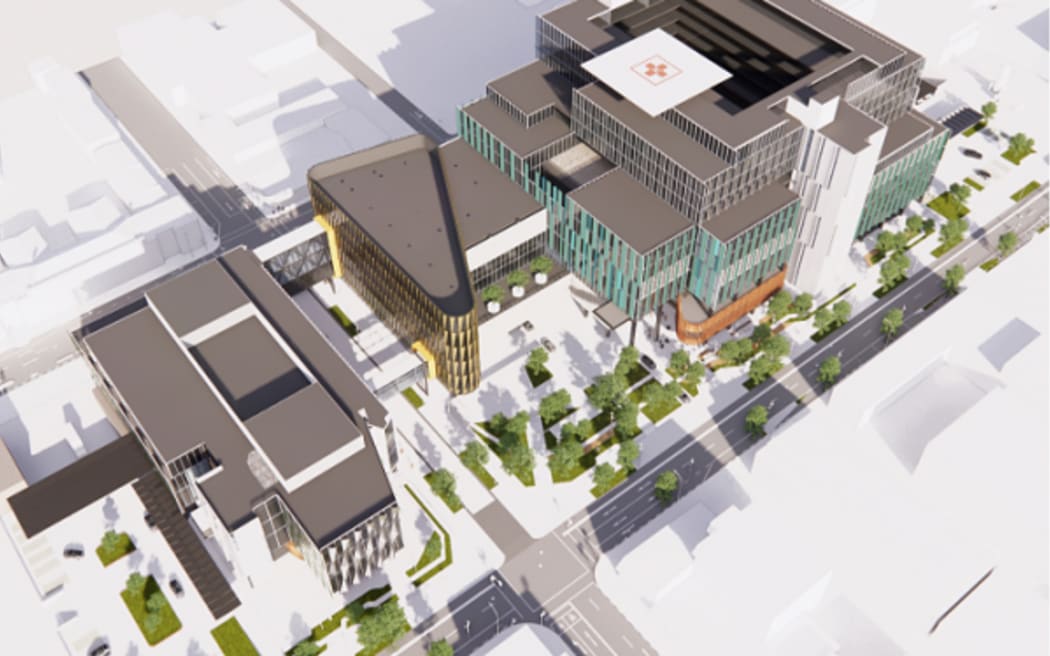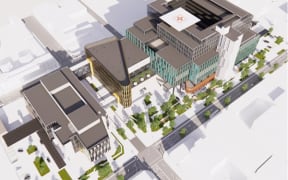
The plans for the hospital. Photo:
Dunedin City Council will consider paying up to $130,400 to fight changes to the city's new hospital that would see fewer beds, operating theatres and MRI units available when it opens.
Last month, the government announced an additional $110 million after project costs ballooned by $200m, with the remaining $90m shortfall being met through design changes.
When it opens there will be 398 beds, not 410 as first planned, 26 operating theatres instead of 28 and two MRI units instead of three.
But there is space for all these facilities to meet the original plan in the future.
Grey Power Otago Association president Jo Millar said she did not want shell spaces - she wanted beds in wards, as originally promised.
"We're going to find that the costs of everything is going to get higher and higher. Surely it makes more sense to put it all in now at the current cost, instead of trying to get people to be fundraising or getting money to bring it up to standard in a few years' time."
On Tuesday, the Dunedin City Council will consider if it's willing to fight against those changes.
The notice of motion asks the council to fund a public campaign, seek other funding and commit to opposing changes to Dunedin Hospital that will compromise its longevity or services.
It was put forward by former Labour minister and now councillor David Benson-Pope and seconded by Dunedin mayor Jules Radich.
Millar has already canvassed some of her members about whether they would support a public campaign.
"They all want the hospital fixed up, sorted out, and put in line as it was originally accepted to be done - and it needs to be done now, not piecemeal and not waiting for something in the future, which again we're going to have to look for funding for. It needs to be sorted out now."
She believed a public campaign could keep the changes at bay - it has worked before. In 2010, roughly 10,000 people marched down Dunedin's main street against plans to relocate the city's neurosurgery services, prompting the government to backtrack.
She wanted the hospital to be done once and done right.
"Let's get the ambulance sorted out at the top of the cliff without having to pick up the pieces at the bottom of the cliff."
A bridge linking the inpatient and outpatient buildings and a non-clinical pavilion building have also been scrapped.
Disabled Persons Assembly Dunedin kaituitui Chris Ford said the changes were disappointing.
"It has implications in particular for disabled people. For example, the removal of the overbridge means that there is just one element of access that will be missing from the new build."
While the new build has significant improvements to accessibility, he was worried what would happen if the purse-strings were pulled even tighter in the future.
"We're concerned that the accessibility might be one of those areas that might be compromised if there are any further cuts. Because if you start making cuts now then it might be easier to just justify the next step in terms of making further cuts down the line."
He was onboard with the council's proposal to campaign against the changes.
"If we were to have a successful campaign which reversed the cuts to the new hospital build, that would be a very good investment for the city to make, for not only the city itself, but for the wider southern region."
Health Minister Andrew Little said it was misleading to characterise building a whole new hospital with expanded capacity as 'cuts'.
"The new hospital will expand capacity compared to the current hospital, in some respects significantly - for example 26 surgical theatres rather than the current 16," Little said.
When asked about the public campaign, he said that decision was a matter for the council.
"The new Dunedin hospital is a significant investment for the government, and is subject to a high risk of cost escalation. We have increased funding by $110 million to ensure no reduction in the original planned clinical capacity."
On the streets of South Dunedin, people had mixed ideas about whether the council should fund a campaign.
One resident called plans to fund a campaign "a waste of money", while others said it was a good idea and the changes should be opposed.



